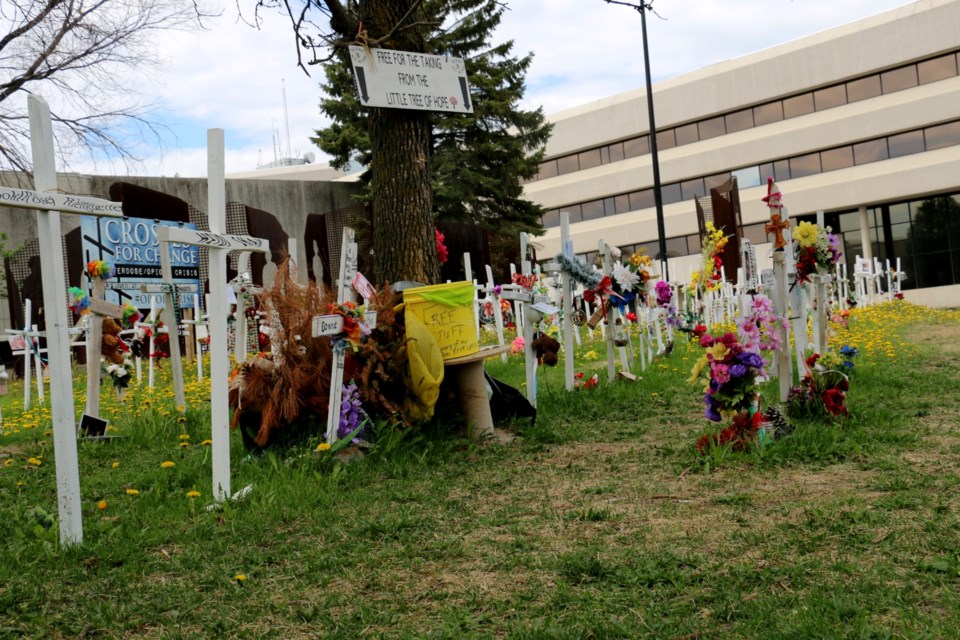On Aug. 20, Health Minister Sylvia Jones announced the official end of all but nine supervised consumption sites in Ontario.
Over the course of the two days prior to her announcement — Aug. 18 and 19 — three people died of toxic poisoning in Sudbury, said Sherry Price, co-chair of the steering committee for the Greater Sudbury Drug Strategy.
When the weeks turned into months, then years, Price told Sudbury.com she knew something was wrong with the funding for The Spot, Sudbury’s supervised consumption site.
She said she knew it was bad news when the government-ordered site reviews were completed “very early this year,” but there were crickets from the government until Aug. 20, the day they announced a ban on all new sites and the official end of Sudbury’s.
“We knew that they were conducting a study based on the shooting in close proximity to the supervised consumption site in Toronto, and they were using that as a way to delay response to our application,” said Price. “Given that we understood that that review had been completed very early in 2024 and we had still heard nothing, I think it made all of us a bit nervous.”
Those nerves are fears now, said Price, but also, cautious optimism.

“Some of the things within this announcement fit beautifully with what came out of the summit,” she said, referring to the Greater Sudbury Summit on Toxic Drugs that took place in December 2023. Price said the new announcement could mean more centralized care, which was a priority coming out of the summit, as was affordable and supportive housing.
Supervised consumption services and safe supply were also pieces of the drug crisis puzzle the 2023 summit summit attendees
“Those have been taken off the table,” she said. “That means we have to work harder with our community who use drugs to keep them safe.”
Part of that work is education, said Price, and getting the message out about supports like the National Overdose Response Service, referred to as the NORS line. The toll-free number is 1-888-688-NORS(6677)
“People who are using alone can call prior to using so that if something goes awry, there is a plan in place to summon help, call someone, call the ambulance,” said Price.
The importance of having a resource that monitors people who use alone is highlighted in a recent study by Public Health Ontario. That study found the vast majority of those who died from an overdose or poisoning lived in their own home and died alone: 72 per cent compared to 16 per cent who are homeless.
Price said the closure of the supervised consumption site will push more people to use alone, meaning more people will be dying alone, too.
“It will drive people to use alone, unsupervised, unseen,” said Price, “Closure of supervised consumption sites will also push more drug use onto the street, because those people were using in a consumption site.”
Price said the move will do “exactly the opposite” of what the provincial government should be trying to prevent.
“It will drive people to the street,” she said. “ And it will drive more used syringes onto the street because they're not in a building that has the disposal bins.”
And while harm reduction supplies will not be available at the Homelessness and Addiction Recovery Treatment (HART) Hubs announced Aug. 20, there will still be supplies available from Public Health Sudbury and Districts and their community partners, and the Réseau ACCESS Network will continue needle pick up in the city.
If you do encounter a discarded needle and you wish to remove it, you can find details to do so safely here.
Price also notes that the Community Drug Strategy works with “the whole of the substance-using population” and has also begun offering workshops.
“We just finished a community practice where we were talking about how the construction industry and the mining industry has a significant number of overdose deaths, often related to trauma and ill and work related illness,” she said. “So, we have to look at the entire community, and we do so to the best of our ability.”
But without the supervised consumption site, that could be a struggle, she said.
Price hopes that moving forward, decisions will be evidence-based.
“We need to come together, we need to put health promotion strategies in place,” she said.
Prejudice against drug users and against health-care services provided to drug users also must be addressed, she said. In fact, Price said the province’s decision to all but end safe supply and supervised consumption may actually increase prejudice.
Pointing to the supervised consumption site in Vancouver that opened more than 20 years ago, and the success in Europe, Price said the data is clear.
“Studies have been done; this may be new in Ontario, but this is not new in Canada. There's lots of research to say that supervised consumption sites don't increase crime, don't increase public use, don't increase needles on the street. Everything that we've heard in the last couple of days just has been disproven time and time again. So let's go back to the evidence,” she said.
“We always say every life lost in this toxic drug crisis is preventable, we can prevent these deaths.”
Jenny Lamothe covers vulnerable and marginalized populations for Sudbury.com
